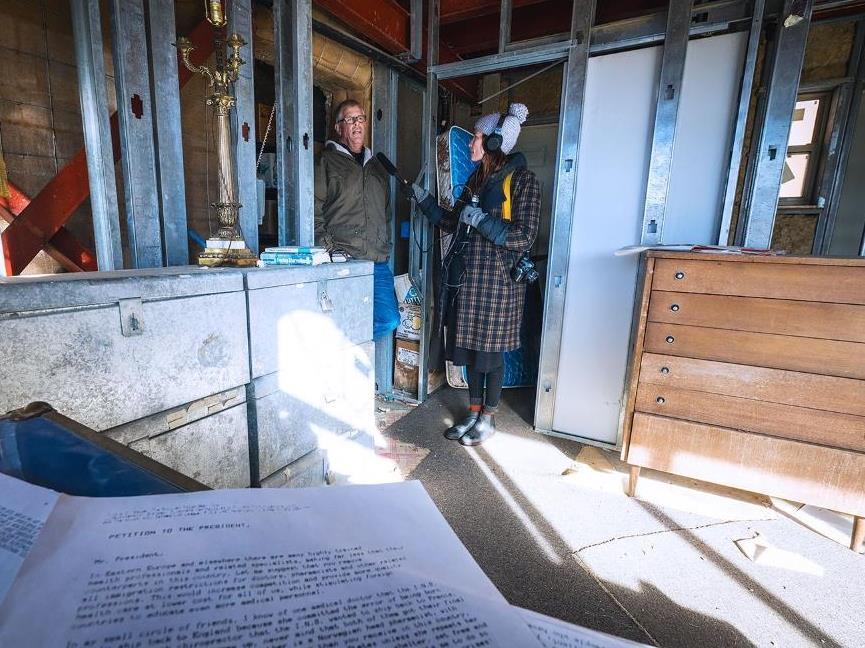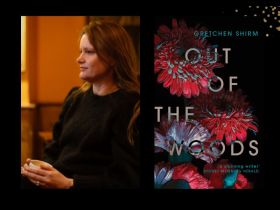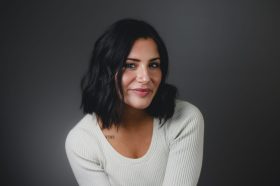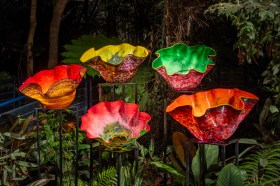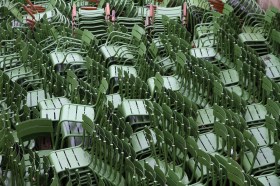Jessica Hamilton recording audio for a forthcoming podcast. Image: Tristan Smith.
Carving out a career as a podcast producer wasn’t a deliberate move for Jessica Hamilton, who fell into the position through her experience working with local radio stations.
‘I studied creative writing at uni and thought I’d be an arts journalist, so I started out writing for my local community radio station,’ Hamilton said. ‘I trained as a presenter and producer for fun on the side and before long I was producing and hosting a couple of shows at 2SER and FBi. I then worked for a while as an audio producer in a busy sound studio with TV and radio advertising clients and a couple of cartoons, where we pumped out high quality work at an insane pace compared to what I was used to in community radio!’
But it wasn’t until she started working as a freelance producer that Hamilton fell into podcasting, which required skills similar to those learned during her days as an audio producer.
‘One of my first big podcast jobs was the Modern Babies series with Nova Entertainment and Genea Fertility, which was an awesome experience in balancing hard science with personal stories, and working with a huge team of stakeholders to produce an honest and informative program,’ she said.
Formal training vs on the job
‘I learnt as a volunteer producer in community radio and on the job. Both have pros and cons. Formal training might have given me a more rounded set of audio mixing and production skills, but the bits of the job that I love have come from working on very varied projects in different environments, and learning from setbacks or achievements as I go,’ Hamilton said.
‘I think first and foremost you need to have passion for something, whether that’s audio, storytelling, or some niche field like Gelatology, which is the science of making people laugh (I picked that one up from the Ologies podcast, which I’m into at the moment!). You can train or self-teach the hands-on skills, but you’ll learn far more from working with people, putting ideas to the test, doing the hard work yourself and getting some solid practice on the job.’
A day in the life of a podcast producer
‘I’ve been mostly working with organisations and brands to produce one-off or short series podcasts,’ Hamilton said. ‘Sometimes I’ll come on board to pull the different pieces together when the idea has already been formed, the talent has been chosen and everything’s pretty much ready to go.’
At other times she said the job can involve everything from casting talent, scheduling, interviews and studio records, to writing and editing scripts. But one of the integral skills necessary for any job is organisation, because of the multi-tasking required.
‘I sort my days into blocks to work on one job at a time, whether that’s scripting, editing or putting together studio schedules,’ Hamilton said. ‘I live regionally so work remotely, which means if I need to be interviewing in studio or in the field I’ll organise it so that everyone is together for solid consecutive days in the city, which is always a load of fun. At the moment I’m working on a couple of my own creative projects, so my work day looks like a surf and a coffee in the morning, then headphones on and I’m lost for hours! It’s the best.’
Highlights and lowlights
‘When I started freelancing I took the attitude of saying “yes” to everything, for the sake of experience and my finances,’ Hamilton admits. ‘Soon I was producing a couple of podcasts, a series of short videos, some conferences and a film festival, and every deadline somehow managed to line up to the space of one week! It was hectic. I was loving everything I was doing but was stressed out of my brain working round the clock and all the important life-stuff (like sleep!) fell by the wayside.
‘I think a lot of people working for themselves in creative industries risk burnout, so learning to say “no” has been a big thing. There have been plenty of highlights, but I once did an audio tour of the Pana Chocolate factory for Fairfax’s Bold Businesses podcast and Pana let me take home as many boxes of chocolate as I could fit in my arms, which was pretty great.’
How to become a podcast producer
For those looking to get into the industry, Hamilton says kindness and determination are two of the best ways.
‘At the end of the day everyone is just trying to do their thing in the best way they know how, so be good to people – but at the same time, respect yourself and your boundaries,’ she said.
‘Spend your time working on things you find fun or interesting, whether through your work or on the side. You might not see how it makes sense here and now but if you do it well then everything will come together in time – and at the very least, you’ll have a fun and interesting time getting there!’
